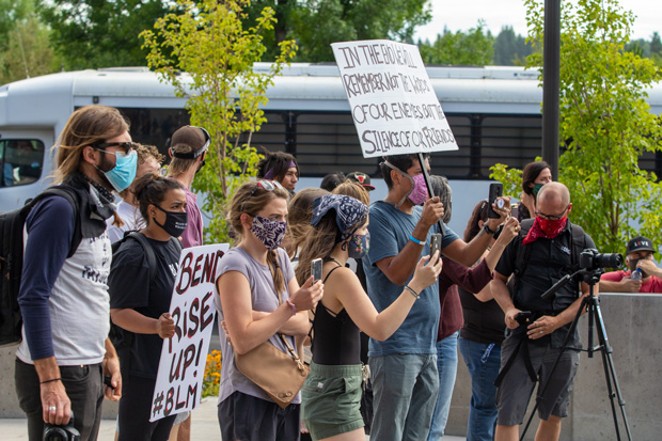Even before the events of last week, we have known that we are living in unusual times. The ongoing pandemic, the unrest stemming from the deaths of George Floyd and so many others and the growing economic uncertainty are all coalescing into a tense time. There's no template for what we are witnessing right now, as people of this nation, this state and this city seek answers.
It is in times like these that the public calls out for real leadership—for flexible, responsive leaders to rise up and share their vision of how we move forward together. Leadership sometimes comes in the form of individuals being willing to share what they know—or what they don't—about a situation. It also comes in the form of public bodies responding rapidly and professionally to questions and concerns.
During the protest that erupted Aug. 12 in front of two U.S. Immigration and Customs Enforcement buses, we witnessed several leaders who showed up and spoke out. We watched as others remained silent. City Councilors Barb Campbell and Gena Goodman-Campbell, along with District Attorney John Hummel deserve recognition for being willing to appear and speak to the moment. They were not operating off some rehearsed script that leaders can use during times like these. Even with so much unknown at that time, they were honest about what they didn't know, and what they hoped to find out. Showing up counts. To that end, the new and already-beleaguered police chief, Mike Krantz, also deserves recognition for alerting locals to the arrival of federal agents.
When people in our communities are scared and plagued by so many unanswered questions, leaders in government need to adapt and to respond, sometimes even sharing what they don't yet know. That is a mark of caring leadership.
Following the night of the protests, when Bend witnessed dozens of U.S. Border Patrol police march in, pulling two men out of the buses and carrying them away, many questions remain that the public would like answered. It is not lost on us that at a time when the community is asking a lot of questions, journalism continues to be ravaged—sacrificed, often, to the modern gods of rumor and speculation on social media. While social media has its place in information-sharing, it cannot replace the work that journalists do. With fewer and fewer resources at our disposal—and fewer and fewer of our journalistic colleagues left employed in this business—it becomes an important duty for those who are left to try to answer the questions that come out of a massive event like the one last Wednesday.
What the community wants to know now centers around how ICE officials gained access to the citizenship information that led them to round up the two men. Was it a breach of citizenship data at the county level? Was there overt cooperation between any local officials and federal agents? These are important questions about how we are governed. And the answers lie in the fact-finding that comes through a journalist's public records requests. It is our right as Americans to have access to emails, text messages and other correspondence between government officials that may help the public understand how the people who represent them operate—especially during times like these.
Right now, that fact-finding mission is stalled. We have an obligation as journalists to get this information and put it in a context that gives you, the reader, a deeper understanding of the systems that may or may not have come into play to see these men identified and rounded up. As local governments operating inside a sanctuary state, our local agencies should not be providing—purposefully or inadvertently—information that leads to the detection or apprehension of people suspected of being in violation of federal immigration law.
The public's best shot at gaining this information is through interviews with public officials, and also through public records requests. We rely on this information to help us sort out rumor and speculation from fact. Obtaining and sorting through these records requests is one thing that separates journalists from the innuendo that flies on social media. As of press time, however, by and large the records requests we have made to various public bodies who may have had involvement in the roundups of the two men have not been delivered. At the City of Bend, we were told Friday we would be given an estimate as to the costs involved in our requests to them. As of press time Tuesday, we have not gotten that estimate nor delivery of our requests. Requests to the Deschutes County Jail and sheriff have also not been delivered. We want to see these records—but so, too, do the many readers who have written, called, emailed or otherwise responded to our coverage of this matter.
In a shrinking media landscape, with so few journalists left standing—especially as it pertains to events that make national news—we hold our public bodies to a higher level of attention and responsiveness. The public wants to know.





















